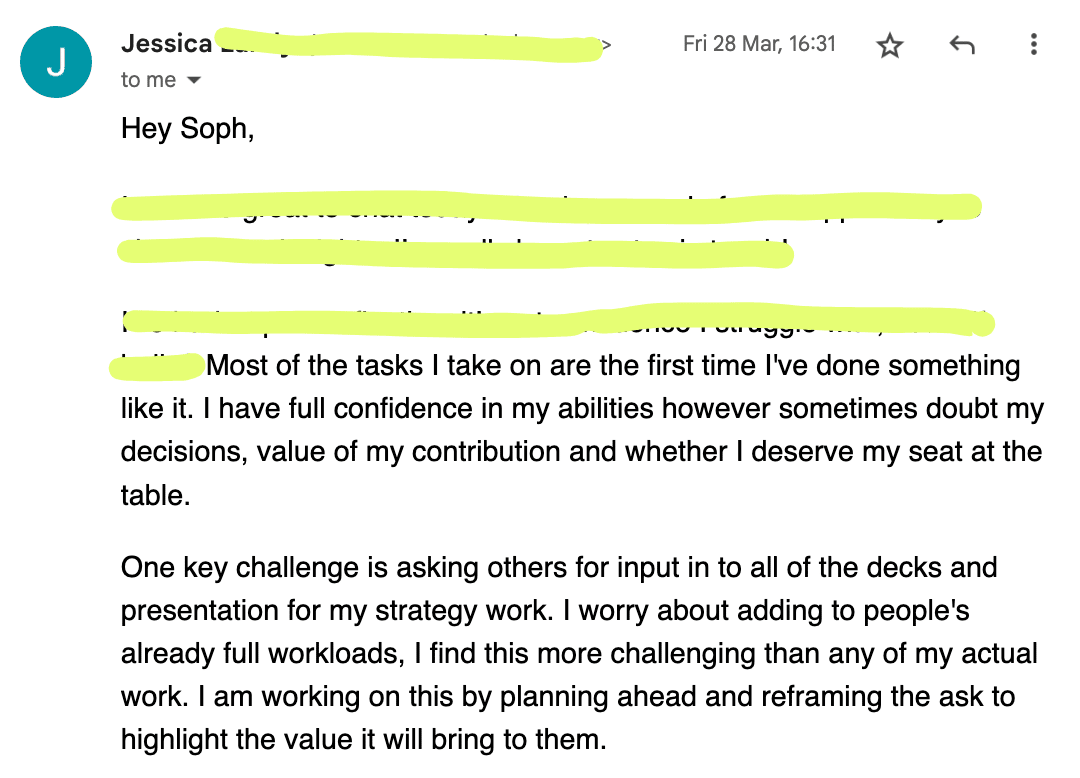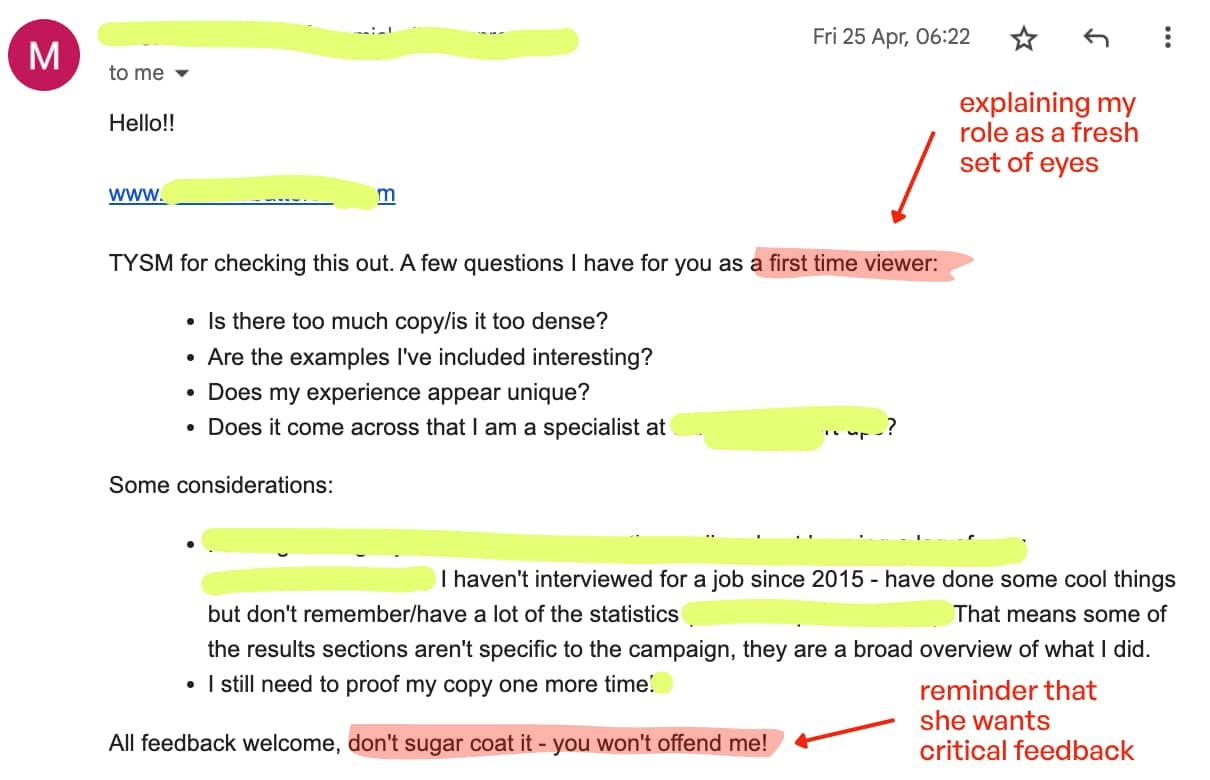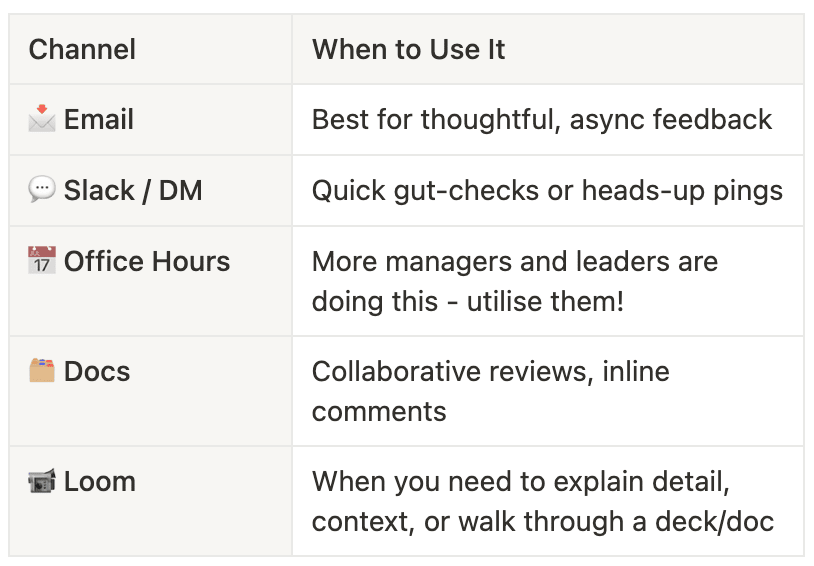How to (respectfully) ask for inputs
"Asking for input from people with already busy workloads...I find this harder than doing the actual work.”
I loved this question from Jess:
How do you ask for stuff from stakeholders, peers and senior folks? (when you’re younger almost everyone is a senior folk…).
First things first, don't feel bad about it. Try this reframe.
🚫 I need something from you.
✅ I've thought about how I can make this convenient for you.
✅ I'm valuing your perspective and I want it included.
1. Get clear on what you need first
Stop and ask yourself:
What do I want from this specific person?
Why does this matter now?
What’s the risk if I miss their input?
Why would they care about this?
Real example:
“Hey Anya
I’m leading this deck that feeds into the Q2 GTM plan and ties to your team’s goal on improving churn.
Request: I’d love your input across the deck, especially on whether it reflects the insights you shared in the meeting last week, and anything key I’ve missed from a customer perspective.- Specifically, Slides 3 and 5 are most important- I’ve highlighted the sections I’m unsure about.
Timing: Please have feedback in by Fri 5pm. Aiming to send it for final review on Mon 6/7. If we miss this, final sign-off gets pushed and we delay launch by 2 weeks. TYSM.”
If you’re not sure what kind of input you need, say that.
Example:
✅ “I’m still refining the structure of the onboarding flow. At this stage, I'm looking for your initial reaction and if any anything jumps out that's off eg flow, clarity, tone. I'll loop back with more specific questions in the next stage”
2. Give context & share stage
The mistake I see all the time is this:
🚫 “Would love your feedback on this!"[as the only instruction]
“Feedback” can mean 100 things. I don’t want to rewrite your deck if it’s due tomorrow. I want to be helpful.
Give the right amount of context for the person and situation:
✅ “This deck is going to senior leadership. It’s 70% baked—what I need is gut-check on Slide 4 (too detailed?) and whether the main message lands"
What people usually want to know:
What’s fixed vs still changeable?
What kind of input do you need? 3 bullets? 3 pages?
What parts do you want feedback on? Specific questions?
Any other useful context (audience, priority level etc)
Even with casual asks to peers or friends, a request with context is going to get you a faster and more useful response. A friend send me this last week:
3. Your poor planning ≠ their problem
Almost any ask is ok if you plan ahead and give people enough time. When you build a rep as a time-respecter, watch 👀 how willing people are to do stuff for you.
It’s mind-blowing.
(Reality is, last-minute asks and forgetting things is all part of the game. See my tip at the end 👇🏼)
🚫 Don’t: Give fake deadlines eg ”can I get this EOD?” when that’s only serving you.
✅ Do: Get into the habit of giving people a quick heads-up as soon as you know you have a feeling you'll want their input.
Example:
“I’m pulling together a deck that feeds into the marketing plan (due in 3 weeks). I’ll send you the topline draft by Fri. Your review and comments will be valuable. Would it help if I pre-block 20 mins in your calendar that day to review?”
4. Use the right channel (for them, not you)
For VPs and execs, check with their admin / your manager. For most people, you can ask them direct.
Next time you send someone something, follow up with:
“btw - was this the best channel for this? if not, where you would have preferred to get it. was it the right amount of context? what did you need more/less of?
Super rough guide (use your judgement 🙏🏼)
Tips:
💥 For people I interact with a lot (daily, weekly) I love doing a full How We Work session.
💥 For VPs and execs, sometimes the right channel is via someone else (like their chief of staff or your manager). If so, draft the request for them, so it’s easy for them to forward on.
5. Don’t seed annoying seed gratitude
The fastest way to make someone feel burdened?
Tell them you’re a burden.
“Sorry to be a pain, but can I ask you to review…”
“I know this is annoying, but can you take a look?”
Seeding gratitude and collaboration:
✅ “Your POV on this will be value because [reason]…”
✅ ”Thanks your input at this milestone - this will help me course correct..”
✅ “If you can review the below and LMK what I’m missing, i’ll make sure it’s updated..”
When you pre-apologise, you’re seeding the idea that you/your request is a nuisance. You’re saying “please view this as annoying”. It’s only annoying if it’s unclear or last minute.
So about last minute asks...
6. What to do when it is last minute?
🚫 You’ll be tempted to make up an excuse. But, people are smart and they can generally smell it.
I’ve always had success by being open about it (everyone struggles to keep on top of the hundreds of tiny things they’re doing, people get it).
Instead try:
✅ “I meant to send this on Tuesday and didn’t . Updating my workflow to avoid last-minute asks like this.”
✅ “If you can help today, it means we log the ticket and launch on time. I’ve done XYZ to make it quicker on your end.”
✅ “Totally get that this is a late ask and it messes with your day. If it’s not doable, I understand — just let me know either way. Thank you so much.”
Love you
Soph







